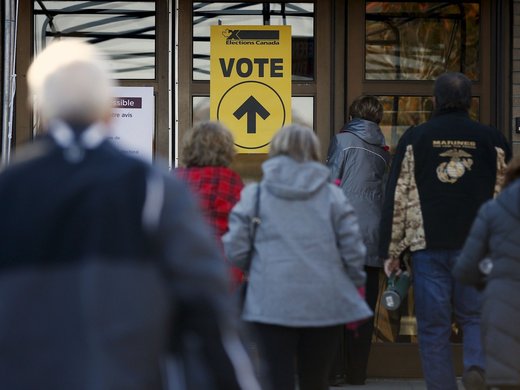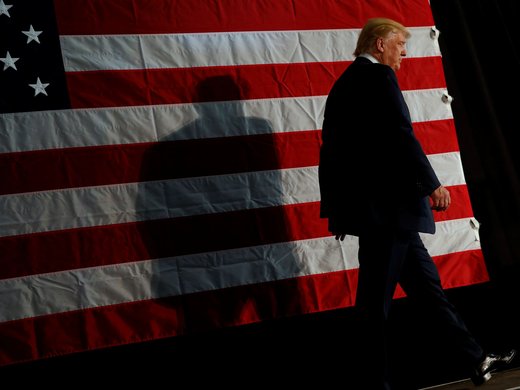CIGI experts outline what's at stake in the US election in relation to international trade, the global economy, climate change and more.
Jeff Rubin on Trade Policy
The interesting subplot lurking beneath the scandal-filled histrionics of the US election campaign is the sudden political enfranchisement of an economically marginalized industrial working class.
Long ignored by the Washington establishment, their plight has become the rallying call for both the left and the right, as evidenced not only by being the centrepiece of Donald Trump’s economic agenda but as well by Bernie Sanders surprisingly strong showing in the race for the Democratic Party nomination.
[That] Trump['s] message has resonated among American workers, is a cautionary light on ratifying and implementing new free trade deals like the Trans Pacific Partnership Agreement.
Could a return to the original Canada-US Free Trade Agreement which preceded NAFTA suddenly position key Canadian industries like vehicle assembly and parts inside the tariff wall that a Trump administration pledges to build?
Tom Bernes on Economic Policies
The US election has ushered in a period of uncertainty for the global economy...
[Trump] has failed to set out a coherent economic program, threatened trade wars (such as canceling NAFTA) with dangerous consequences for the global economy, undermined the role of the Federal Reserve and created huge uncertainties for the global economy. The Economist Intelligence Unit rates his election as one of the top twelve risks to the global economy.
Jacqueline Lopour on Trump, the candidate
Donald Trump's candidacy has defied all expectations, possibly including his own.
Trump has both said and done things that would have absolutely tanked the chances of past candidates, yet he has emerged stronger than ever among his supporters.
Not to mention the fundamental disregard for fact checking. Most politicians stretch the truth during campaigns; Donald Trump's campaign takes this to levels, and his supporters seem to not care.
The rhetoric of this race has been outrageous. Some of Trump's comments violate the most basic democratic tenets Americans have traditionally held dear. In one debate, he threatened to arrest and jail Secretary Clinton if he becomes president. This is scary autocratic rhetoric you would expect in a third world dictatorship – not in a democracy.
Wil Burns on Climate Change and Energy Policy
While climate change and energy issues have not played a prominent role in the food fight that is the 2016 US Presidential election, they will assuredly loom large in [a] Trump administration.
For the United States to meet its Paris Agreement obligations to reduce greenhouse gas emissions by up to 30 percent in 2025 and to cut emissions more than 80 percent by 2050...
Donald Trump’s positions on climate and energy are radically different.
He has labeled climate change science a “hoax”, and at times has suggested that it’s a plot of the Chinese to undermine the US economy. He also also vowed to “cancel” the Paris Agreement and has indicated that the Clean Power Plan should be scrapped.
While Mr. Trump initially characterized renewable energy as “losing” propositions, he now advocates development of solar and wind, and biofuels alongside an aggressive effort to revive the coal industry and expand oil production and nuclear power production. He also advocates devoting more federal land, including offshore areas, for oil and gas production.
Finally, Mr. Trump has advocated repealing regulations that he believes unreasonably interfere with expanding energy production in the US, such as the Department of the Interior’s Stream Protection Rule, concerning the impacts of coal production on aquatic environments.
Simon Palamar on Trade Challenges
This election has turned conventional wisdom on its head. The Republican nominee is an Ivy-league billionaire who has fashioned himself as the tribune of America’s white working class. He is repudiating free trade – arguably one of the Republican Party’s great successes of the last 25 years.
This election has also exposed the weakness of the Republican Party’s – and the strength of the Democratic Party’s – professional core.
The Republican Party was unable to stop a profoundly unpopular candidate with policy views antithetical to Republican orthodoxy from winning the party’s nomination...
Both candidates offer some challenges for Canada, but Mr. Trump’s are certainly bigger.
He is disdainful of NAFTA, despite the fact that Canada is the most important trade partner for some 35 states. His attitude towards undocumented Mexican immigrants will profoundly harm relations between Washington and Mexico City, which will create headaches for Ottawa. He is either unaware of (or simply does not care about) how and why the US has worked with alliance partners around the world when making decisions about where to deploy the US military and when to go to war.


